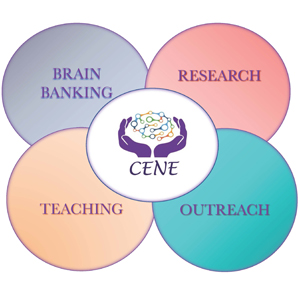Hispano-American Brain Bank
About CENE

CENE Objective: Tissue distribution, research, teaching, and outreach
CENE is an organization with four goals: brain collection, research, education and enhancing public awareness about the importance of human tissue availability for scientific research on brain functions. These activities are performed in Spanish and English, in Latin America and the U.S.
CENE is currently collecting brain tissue of patients with autism and fragile X. CENE is also collecting brains of those with Down syndrome and other neurodevelopmental conditions. Tissue collected and distributed by CENE so far has made many pathology, molecular, and genetic studies possible. These studies have added a great deal of knowledge to the understanding of neurodevelopmental conditions, particularly in fragile X.
CENE promotes research collaborations between nodes, with the intention of supporting the development of young researchers focused on the study of autism and other neurodevelopmental conditions.
CENE promotes student exchange between nodes, including trainees at the undergraduate, graduate and postdoctoral levels and early-career professors. Trainees at each node can participate in internodal projects and internships in other CENE countries, giving them the opportunity to acquire an international scientific education.
One of CENE’s goals is to organize outreach activities. Those could include information distributed to patients at their physician’s office and hospitals, to foundations dedicated to neurodevelopmental conditions, in social media dedicated to autism education (CENE Facebook and CENE Twitter) presentations at scientific conferences directed to researchers and physicians and at public conferences directed to patients and families.
CENE is the first large-scale brain bank for neurodevelopmental conditions in Hispano-America, an initiative created by Veronica Martínez-Cerdeño, professor of pathology at The University of California, Davis School of Medicine. CENE has established a system of nodes and teams in several countries: The U.S. (California), México, Puerto Rico, Colombia, and Dominican Republic. The California node emerged from the Brain Repository in FXS and FXTAS (Fragile X-associated Tremor and Ataxia Syndrome) at UC Davis. This repository was established in Sacramento by Paul and Randi Hagerman in 2000. Martínez-Cerdeño has been the pathology director since 2011, and Randi Hagerman is the clinical director. The node in Mexico was established in 2018, the node in Puerto Rico and Colombia in 2019, and the node in the Dominican Republic in 2020.
Each node is divided into clinical and pathology areas, and a qualified clinician and/or researcher is in charge of each of these. The pathology directors are responsible for brain extraction, tissue preservation and tissue distribution. The clinical directors are in charge of localizing donors, obtaining consents for donations and establishing a network of psychiatrists, psychologists and pediatrician who are experts in autism and neurodevelopmental conditions in each country. Each director has a team of collaborators in their own country. CENE has a board of advisors that are worldwide leaders in postmortem autism research.
Neurodevelopmental conditions are a series of conditions that present with brain dysfunction due to an alteration in the processes of brain development. They present with neuropsychiatric, cognitive, and motor symptoms. Autism and fragile X syndrome are two of the most common neurodevelopmental conditions. Human brain tissue is a scarce resource that is obtained from postmortem donations. Postmortem donations in cases of neurodegenerative conditions, where the donors are of advanced age, are more common, and numerous brain banks for these conditions exist around the world. In the case of neurodevelopmental conditions, specifically autism, the reduced brain donation rate prevents researchers from investigating the pathology and fine anatomy in these conditions. CENE is the first large-scale brain bank for neurodevelopmental disorders in Latin America. CENE ensures that postmortem neurodevelopmental condition samples used in research better match the world’s genetic and ethnic diversity. CENE enables and expands neurodevelopmental condition brain research worldwide, particularly with respect to autism and fragile X, and increases the availability of brain tissue from neurodevelopmental conditions to researchers around the globe.
Institutional Review Board approval or its equivalent is completed individually for each node, following local and national laws, before the coordination and/or collection of brain tissue and personal health information takes place. All investigators requesting tissue meet all ethics approvals before tissue is distributed. Only a limited number of designated representatives from CENE that are involved in the procurement of tissue and medical records have access to the donor’s personally identifiable information. They de-identify all associated records, using a unique identification number for each case.

